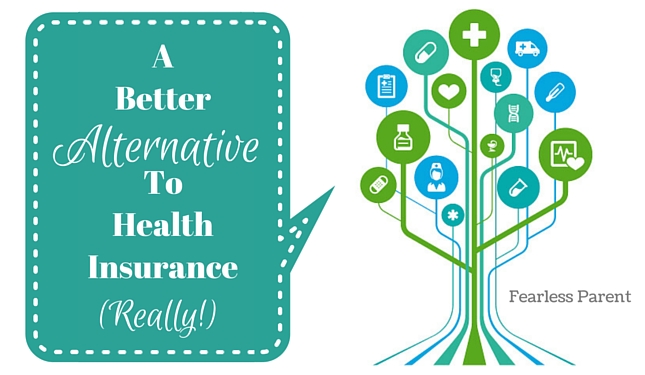Note: We’ve gotten mostly fantastic feedback on this post about health care sharing ministries but a question is coming up. Why do some ministries exclude non-Christians or same sex married Christians or children born to mothers without paternal involvement? Those of you who know me won’t be surprised that these comments have kept me up the last couple of nights. So much so that I added a section in my post called: “Why are some people excluded?” It’s not an answer so much as an opening. Consciousness is growing and the divine spark in each of us is the same in us all.
Last year, we canceled our Blue Cross Blue Shield plan because we found a better alternative to health insurance. Yes, you read that correctly. We signed up for Samaritan Ministries International, a health care sharing ministry. It took me the better part of a year to make the switch because I was afraid to cut the cord (and my husband thought I was nuts). I wrote about our decision process in this blog: Buh-bye, Obamacare! Hello, Health Care Sharing, which provoked a lot of interesting discussion and some intrepid defectors who joined us (read the blog comments).
So, here we are, one year later. I wanted to report back to let you know how we’re feeling about our choice. And if you’re in a health care ministry, I’d love to hear about your experience. For us, it has been…
The.Best.Decision.Ever.
Seriously. I wish we had done it sooner. In fact, I wish I had signed up while I still had corporate health insurance coverage over a decade ago. Want to know why?
We would’ve had the love and support of a community that really cares about its members. Think that’s corny? Just ask any Samaritan member with a medical need who switched from health insurance about her experience during a health crisis and it will blow you away. I, for one, burst out crying. More about that below.
We would’ve saved even more money… not just on the net monthly differential of the two options, but on the many tens of thousands of dollars in deductibles, co-pays, and the scads of other unreimbursed expenses that would’ve been “shared” (in Samaritan parlance).
We would’ve had a greater degree of freedom to explore the practitioners and treatments that we wanted. When you’re plowing a fortune into health insurance, it’s a kind of financial masochism to avoid nearly every kind of practitioner or treatment that’s covered… but that’s what we did. So we ended up paying into two separate systems — conventional and integrative/functional/alternative. No more!
We would’ve been supporting a program that is aligned with our values all along. Being in integrity with our beliefs feels good. It really bothered me to pay that Blue Cross premium every month. The concept behind health care sharing ministries pre-dates insurance; it harkens back to ancient times when communities came together and helped one another. It worked then and it works now. It’s an idea whose time has come… again.
Our first medical need
So… as fate would have it, our son was diagnosed with a serious eye disorder a few months ago. This came out of nowhere, during a routine eye exam for visual acuity by an eagle-eyed OD, and we were gobsmacked on every level. Members for six short months, I dialed Samaritan, feeling a combination of sheepish, overwhelmed, and incredibly anxious. Ugh… what if this doesn’t work?
I was filled with dread. Calling insurance companies usually goes something like this:
- The recorded prompts send me to the wrong department.
- I’m put on hold and it takes a very long time to reach a live person.
- The reps are often apathetic or adversarial.
- There’s almost always a deductible to satisfy or some other provision that explained why the treatment isn’t covered.
But with Samaritan, I was in for a big surprise:
- A rep answered after two rings.
- He emailed me forms and set everything up.
- He invited me to contact him directly, by phone or email, if I needed anything further.
- And then he asked if I would mind if he prayed with me.
Eye roll anyone? Not here. The floodgates opened and I allowed myself to exhale, with tears streaming down my face. A stranger in this new community reached out through the phone to hold my hand and offer up a fervent prayer for guidance and healing.
The call was warm-hearted, palliative, and hopeful. This very frightening thing was happening in our family but we now had a real ally. And the financial side of it was not going to add to our woes. I would be able to focus my attention on finding the right care for him.
What expenses did Samaritan share?
Since Samaritan is not an insurance company, we don’t use words like claim or premium, nor do we ask “is it covered?” Instead, we say medical need and monthly share, and ask “is it a publishable expense?”
We’re four months into the process. So far, Samaritan has published over $19,000 worth of medical expenses. These include:
- Comprehensive evaluation at Wills Eye Hospital in Philadelphia
- Second opinion and follow up evaluations at Weill Cornell Medical College in Manhattan
- Individualized nutritional assessment
- Cranial sacral therapy
- Consultations with a nutritional optometrist, an integrative ophthalmologist, a developmental optometrist, and a holistic pediatrician
- Surgical clearance from a family practice physician
- All lab tests
- All prescribed supplements (up to the 120 day limit)
We are free to choose all providers and we aren’t limited to a list of in-network physicians, therapists, labs, or hospitals.
Guidelines are member-driven. Here are a couple of things that members don’t share:
- Travel expenses that are not pre-approved. They will share plane travel and lodging for treatment that is not available locally or that will reduce costs.
- Specialty food items and food processing equipment that are prescribed by a physician.
We’ve received 41 checks from Samaritan members so far… almost all of them containing really lovely cards and notes, with prayers, kind messages, and sometimes even little drawings.
Reasons it may be better than health insurance
When we first evaluated Samaritan, I did a lot of research… but there are things that I could’ve only learned by going through our first medical need. Here are a some more answers and a bit more perspective after almost one full year under our belts:
DOES THIS MAKE SENSE FOR MY FAMILY?
First things first, Samaritan is a Christian health sharing ministry and there are important eligibility criteria. If your family isn’t Christian, there are other choices… I’ll discuss another option below.
If your family is never sick, this could be perfect for you. You have no pre-existing conditions so future medical needs will be publishable. And for most people, your monthly share will be a fraction of what you pay into insurance. We pay $405/month, about 20% of what we would’ve been assessed under ACA.
If you have a pre-existing condition, don’t rule Samaritan out. The limitation applies to the specific diagnosis. For example, you will not be permitted to publish expenses for the Lyme disease that was diagnosed two years ago. You would, however, be able to submit them as a Special Prayer Need. This means that members may voluntarily send checks to help defray non-publishable expenses. And they do. Further, if you develop something else, say hypothyroidism or severe allergies, even if it’s precipitated by the Lyme disease, that’s a separate medical need and expenses for that need can be published.
If you have health insurance, this kind of plan can still make sense. Samaritan will share expenses for an approved medical need that are not covered by your insurance company. As we all eventually discover, having health insurance doesn’t mean you’re fully covered. This includes deductibles, co-pays, balance billed items, and out-of-network treatment. Depending on the type of medical condition, this can save you a lot of money.
If you have health insurance and don’t want it, your employer might give you a credit if you opt out. Ask!
If you want your employer to offer Samaritan, suggest it. It will be a lower cost option and they’ll probably love you for it. If you are a small business owner who is obligated to pay through the nose for employee coverage, this might be the answer to your prayers. Their number is 888-268-4377.
If you have a very complex medical need that threatens to blow through the $250,000 per need cap, there’s always “Save to Share.” You can read about it here. It’s simple to understand and very inexpensive to add. Most months, you don’t pay anything at all. In the past year, I paid less than $20 towards this program to support other members. In over 20 years of operation, Samaritan’s Save to Share program has been more than sufficient for needs that have exceeded $250,000.
HOW DO I KNOW WHAT THEY WILL PUBLISH?
All our publishable expenses were prescribed by a licensed practitioner. If your doctor prescribes it, Samaritan will consider publishing it.
Up to 40 therapy treatments of all kinds (chiropractic, physical, occupational, cranial, etc) per medical need will be shared if ordered by a licensed provider. There is no cost restriction on the cost of the therapy.
Samaritan was prepared to share the purchase of a prescribed medical device, up to the cost and in lieu of the remaining allocation (now about 36) of in-office therapy sessions with that same device. We’re trying to decide if this makes sense. If we decide to sell the machine, we promise to send the proceeds to Samaritan to be shared with other members.
Samaritan will publish up to four months’ worth of supplements prescribed by a licensed practitioner, if accompanied by a treatment plan specifying the formulation, dosage, and frequency. Supplements purchased outside the four-month window can be submitted as a Special Prayer Need.
HOW DO I JUGGLE THE PAPERWORK?
If you have a significant need, I won’t lie. You have to keep up with it. It’s not too bad, certainly easier than decoding the mysterious “explanation of benefits” statements from insurers, but you do want to be organized. While you’re face to face with the practitioner, ask for what you’ll need… namely, an itemized bill and a prescription for any supplements, medication, therapies, or other treatment. Have the forms with you so they can be signed on the spot. Documentation must include the providers’ credentials.
As a self-pay patient, some providers will apply a meaningful discount if you offer to pay in full. If you have difficulty obtaining an itemized bill from a provider, The Karis Group will intercede on your behalf.
It takes over two months to start receiving checks. Most providers are patient and will wait if you explain there will be a delay. Samaritan processes all need submissions received by month-end. Most recently, I sent in documentation for expenses incurred in October (and one from September; it took awhile to get the superbill) by October 28, to make sure it was received by October 31. It takes them a month to process and approve (or decline) the expenses. Most members send their monthly shares by the third week, so I can expect to receive October’s expenses by mid- to end-December. If The Karis Group gets involved, it can take an extra month.
HOW EASY IS IT TO COMMUNICATE WITH SAMARITAN?
Samaritan communicates and shares information by phone, e-mail, mobile app, and web portal. A rep calls me by phone every month to let me know what was published. I can send an email to inquire about administrative issues, including follow up for missing checks or requests that checks be re-issued (i.e., payable to me and my husband and not to my son). As for record keeping, all checks can be logged online. Samaritan just wants to know three things: 1) who’s it from? 2) what’s the check #? 3) did they send a note?
Easy-peasy.
WHAT IF WE’RE NOT CHRISTIAN?
Look into Liberty HealthShare, which is another eligible health care sharing ministry under the Affordable Care Act. These are the biggest differences:
- Liberty has three different options that offer 70% or 100% cost sharing, up to $125,000 or $1 million per incident, with a $5 million lifetime limit. Samaritan has one program for all members, with 100% cost sharing up to $250,000 per incident and no lifetime limits.
- Liberty charges an annual membership fee — $125 the first year, then $75. Samaritan assesses a one-time $200 fee.
- Doctors send bills to Liberty. Members send bills to Samaritan.
- Liberty shares annual physical exams. Samaritan does not.
- Liberty has special rules for pre-existing conditions and provisional membership status for those with chronic health conditions.
- Liberty allows members to worship in their own way as long as they believe that personal rights and liberties originate from God. Samaritan requires members to attend church.
- Liberty does not have a program that invites members to share expenses outside guidelines.
- Liberty reimburses providers at the Medicare allowable rate plus 50-70%. Samaritan has no such limitation.
WHY ARE SOME PEOPLE EXCLUDED?
It never feels good when we learn that we’re not eligible for something. While Groucho Marx famously said that he didn’t care to belong to any club that would have him as a member, most of us would prefer to be invited to the party. Depending on the criteria, we can feel rebuffed, offended, or even disgusted by exclusionary rules. This post is not the place to take on a debate about same sex marriage or reproductive rights. Suffice it to say that thoughtful, decent, lovely people — even among our family members and closest friends — will disagree about a great many important issues (take a look at one of my lead advocacies).
Our founding fathers understood how precious are our most sacred beliefs. Religious beliefs are Constitutionally-protected and for good reason. How many of us have exercised a choice because of a deeply held belief? Perhaps you’ve taken a conscientious exemption to opt out of military service… or a religious exemption to opt out of vaccine mandates because you find the injection of animal or human diploid cells to be morally or religiously repugnant. Maybe you belong to a likeminded group or values-aligned community where you gather in solidarity for support, encouragement, and joyful expression of your beliefs.
Even though differences exist, change comes. When we consider the varied ways that society has progressed, our memories may be seared by hatreds and fears, protests and wars, but we would do well to remember that profound shifts happen in the heart when there is a softening and an opening. We cannot find common ground and mutual understanding when we harden into our certainties and blast others with anger or self-righteousness.
Before getting too incensed at Samaritan and other health care sharing ministries for forming their own “clubs,” it might be helpful to know that their existence is based upon a religious exemption. They are 501(c)(3) organizations whose members “share a common set of religious and ethical beliefs and share medical expenses among members in accordance with those beliefs and without regard to the State in which a member resides or is employed.”
Is it possible that at least some of the ire is misdirected? Aren’t we disappointed that our health care system is so broken and the solutions presented by government and corporations are, frankly, piss poor? There’s a lot of complaining on social media — understandable but soul sucking and futile nonetheless. Passionate and determined individuals can create remarkable solutions. Rather than throw poison darts in the darkness, let’s refocus our energies. It seems to me that this is an area that’s ripe for innovation. The success of these organizations is inspiring. Why not create another ministry that includes those who are excluded and work from that space?
This is the thing we wish existed
For increasing numbers of people, health insurance is broken. It’s overpriced, wasteful, adversarial, and in many cases it is explicitly harmful because it incentivizes the wrong behaviors and treatments. We know about the unholy alliances with drug companies, academic institutions, and government bureaucrats. We are tired of the scale of corruption and back channel dealmaking… not to mention the multi-gazillion dollar pay packages of the corporate CEOs running these behemoths.
I love this idea of health care sharing. Simple though it may be, it’s powerful. It’s a bit of ancestral wisdom that has the potential to be a kind of disruptive “technology.” Imagine what could happen if millions of people opted into a better system?
***
If you choose this option, we’d love to know. And if you tell Samaritan that Fearless Parent™ (Louise #64821) sent you, and ditto for Liberty (Kelly Brogan #082186398), they’ll send us a small referral fee that will help support our work.
 Louise Kuo Habakus is the founding director of Fearless Parent™, lead host and producer of Fearless Parent Radio™, and mom of two. She is a published author, runs the non-profit Center for Personal Rights, lectures widely, and has appeared in numerous media outlets, including ABC World News Tonight, Fox & Friends, and The New York Times. Louise was a Bain consultant and a C-level executive in the financial services industry. She holds two degrees from Stanford University.
Louise Kuo Habakus is the founding director of Fearless Parent™, lead host and producer of Fearless Parent Radio™, and mom of two. She is a published author, runs the non-profit Center for Personal Rights, lectures widely, and has appeared in numerous media outlets, including ABC World News Tonight, Fox & Friends, and The New York Times. Louise was a Bain consultant and a C-level executive in the financial services industry. She holds two degrees from Stanford University.
STANDARD FTC DISCLOSURE: In order to support our blogging activities, Fearless Parent™ may receive monetary compensation or other types of remuneration for our endorsement, recommendation, testimonial and/or link to any products or services from this site. Please note that we only ever endorse products or services that align with the Fearless Parent™ standards and that we believe will benefit our valued readers. You may read our full disclosure statements here.













We also are with SM – one of the few Heath sharing options that share alternative approaches to healing. Love it!
Everyone should read about these options
I had no idea about Samaritan Ministries as an option for health insurance! Definitely worth looking into!!
Thank you so much for this. We just enrolled for next year but I think this will be the last time. Very happy to read about a real family’s experience.
Can one sign up for one of these as primary “insurance,” while keeping health insurance provided by the workplace as a backup for catastrophic issues? (I don’t even know if that makes sense.)
Yes!
But Samaritan covers everything beyond 300 for big issues. And over 250K if you buy the catastrophe option
What about Liberty?
We just signed up for Liberty and choose the most comprehensive option ($450 a month for family) – it covers up to 1 million per incident. Here is the breakdown: http://www.medicalcostshare.com/liberty-healthshare-program-options.html
We had a terrible experience with Liberty Health Share and didn’t even have a claim. I would stay away from that one. A small paperwork issue took numerous phone calls and emails to resolve. I can’t imagine what it would have been like if we had needed to deal with a medical issue.
As a growing company, there are administrative lags, for sure, but the difference is that they ultimately are invested in the participant’s experience, and you stand to get reimbursed for experiences that aren’t even considered by mainstream insurance companies.
The truth is that if they reimbursed nothing, a typical family is still saving upwards of 2k per month on premiums while meeting current insurance “requirements.”
I would love to hear from those with pre-existing conditions and their experience with Samaritan or Liberty. Which is best if you have already been diagnosed with Lyme? Do these ministries share services for ASD like occupational therapy?
We have Medi-Share and have been very happy with them. But my son was born with an omphalocele (fixed the day of his birth). They did write in a pre-existing condition clause for any future omphaliceles (?) and for anything related to his hearing as he failed his hearing test due to operator error.
I shared about Samaritan before, and glad to hear more glowing reviews from those who did switch. Here is yet another account of this person’s experience with Samaritan, AND also an option for those who are not Christian or do not meet some of the more narrow requirements for Samaritan. It is good to have choices!!!
Natalia, thank you for this! My husband pays $1,000.00 per month for our health insurance and as you are aware, we use alternative medicine which is not covered. Since we are not very religious we knew we wouldn’t qualify for Samaritan (which seems like wonderful insurance) .. so happy to know there may be other options!
But prior diagnoses such as autism, Lyme or pandas wouldn’t be covered? That’s what eats up all our $$!!
That is true, Guilia… but my understanding is that any conditions with a separate diagnosis that arise following a pre-existing condition would be eligible to be shared. For example, if Lyme weakens your condition so you develop a thyroid or kidney disorder, that is publishable. As we know, autism is a broad behavioral/DSM diagnosis. There are many different medical diagnoses that can emerge. It’s worth calling Samaritan with very specific questions. They are incredibly helpful.
A really thought-provoking take on new alternatives to health care. My friend is extremely gifted with the tenacity to leave no stone unturned when she is researching what is best for her family. This is a real consideration for someone looking for alternatives to regular health care costs.
Before you go on autopilot and renew your health insurance plan (it’s open enrollment time), take a few minutes to read about her experience.
This is really interesting.
Very interesting! I had no idea this was an option!
I want to know more about this in terms of autism care and coverage, if there is anyone out there with experience I’d like to connect 🙂
Storm, take a peek at my last post.
My understanding is that any conditions with a separate diagnosis that arise following a pre-existing condition would be eligible to be shared. For example, if Lyme weakens your condition so you develop a thyroid or kidney disorder or allergies, that is publishable.
As we know, autism is a broad behavioral/DSM diagnosis. There are many different medical diagnoses that can emerge. It’s worth calling Samaritan with very specific questions. They are incredibly helpful.
I will see if I can find some autism families… seems it will be helpful to write a separate post about autism.
Thanks! I am interested to know how they would handle services like speech, OT, PT, ABA or other less commonly covered things like neurofeedback, brain balance, homeopathy or even something like MRT. I am guessing that a family like ours would never really be able to escape regular health insurance coverage, but using this as a secondary option to help pay for all of the remaining balances of out of network expenses seems like a good option to explore.
Medical expenses for autism aren’t publishable but medical conditions in autism are. So there’s no sharing for ABA, social skills, or communication deficits, but yes to colitis or Lyme disease or other diagnoses that are very often co-morbidities. Detox and supplements must directly relate to the eligible medical or injury diagnosis and prescribed by the provider. Hyperbaric, physical, occupational, speech, vision, and analogous therapies related to injury or disease are publishable.
If you read through both posts, you will get a good feel for how the program works and when something is no longer considered a pre-existing condition.
With Samaritan, you actually feel like they’re on your side, doing their level best to help you publish expenses. Moreover, the savings generated from the expenses they do publish (that insurance never would) plus the savings in monthly payments (for those who switch) fund a sizable kitty for a lot of discretionary health and self-care spending.
Interesting option
We jumped ship years ago and use Medishare, another Christian sharing plan. I’m intrigued by Samaritan though. I’ve heard that they cover more holistic care.
Thank you for posting. I had just found out about health sharing a few months ago and have been researching like crazy. Samaritan is the one I keep leaning towards but didn’t know anyone who actually had it. So glad to hear a real-life experience about it!
Very interesting.
Interesting alternative to health insurance! I’m going to have to do some more research on this.
Esperanza. Look at this!
Kerry Collins this is the Christian based health plan I mentioned at one time. Click the article to read about 2 companies offering health share plans.
thanks
Great info thanks!
Any references for Liberty Health Share?
Hi, Laurie. Take a peek at some of the comments, including Kelly Brogan’s reply above to someone who was unhappy with a paperwork issue. It’s definitely a good idea to do your own due diligence.
I hope we apply our high standards to all providers, insurance companies included.
I think you will find that healthcare ministries will publish some/many expenses that insurers would never consider… and the savings based on the difference in your monthly payments alone will fund a lot of discretionary health and self-care expenses.
We did too last year! Best decision ever!
Yes! BCBS said they would pay for our home birth but once our son was born they wouldn’t pay a dime. Switched to Samaritans Ministry, Just had our second and birth was paid in full plus we received incredibly sweet cards and notes from other members. It is truly a community and a blessing to be part of!
wow, what a great timing, I was wondering if anyone knows if you’d still get penalized for not having sickcare (aka obamacare), and how much is the fee every year?
I’m deeply disappointed that you would promote and endorse a group that is explicitly (some would say rabidly) anti-LGBT, and that restricts women’s reproductive health care choices. Disgraceful.
Perhaps you didn’t read the whole article to see the Liberty option which is what we use. Nonetheless, to insinuate that everyone with a denominational faith supports the political orientation of its public face is reductionist and divisive in itself.
read the article to the end three times because I love your work and was shocked and SO saddened that you would support Samaritan. Glad that’s not the case. That said the article is About Samaritan, with a mention of Liberty at the end – it could be wise to clarify your message here. And, on the note of Samaritan, I’m not insinuating anything about “everyone with a denominational faith” – that a bit much to read from my comment, and not at all what I said. A core value of Samaritan is explicitly forbidding LGBT couples from joining their ranks, and they actively refuse to support contraception. This isn’t about faith, it’s about actively standing up and saying “I’m gonna back these bigots!” Or Not. Again, glad you’re not counting yourself amongst them, may be a smart thing for you to clarify lest you want your base to think you’re allied with Samaritan and All that they actively stand for.
I read it and I didn’t think that AT ALL. Could be one of those “everybody is against me” things?—……..js
Health care sharing ministries are a fascinating payment model – there’s lot to recommend them. They resemble the state health cooperatives, as detailed at the National Alliance of State Health Co-ops. Unfortunately, the federal government is not following through on the promised funding so many coops have folded.
Back to this Fearless Parent article: The websites of Samaritan Ministries International and Liberty HealthShare are not very clear on what reproductive care is included. Abortion procedures are not covered by Liberty; Samaritan has published material opposing abortion, so it is likely true for that plan as well. As for contraception, sterilization, fertility treatment or other Assisted Reproductive Technology care – who knows? Both plans are also, as the names suggest, Christian-affiliated, and so can potentially avail themselves of some exemptions under the Affordable Care Act.
Of course no one plan will suit everyone. It’s an interesting model, though. However, it’s hard to imagine a very low-income community using a plan like these. Even if a family’s premium is only $400/month, that’s still too much for many families.
This is a good solution for many people who are not a match for obamacare.
Girls, what do you think?
How do Samaritan or Liberty “know” if you’re a Christian or not? Do you have be a church-goer? What if you’re not a “good” Christian, just a mediocre one? What if you’re a Deist, would that be good enough?
Hi, Fred. Samaritan has specific guidelines, which include being a Christian according to Biblical principles, regular church attendance (3 out of 4 weeks per month, health and weather permitting), no substance abuse, no tobacco use, no recreational marijuana use, and limited alcohol intake (never to drunkenness). Pages 14-15 of the guidelines provide more detail. There are annual Member Continuation and church leader forms to confirm that you continue to meet these requirements. Your reaction to the guidelines is a good litmus test. If any of this makes you bristle, then it’s not the right program for you.
Liberty’s requirements allow members to worship in their own way. If you agree with their belief system, then you’re eligible to apply. Read “Do I Qualify?” for more info.
You lost me with this one. So disappointing.
Interesting. Need options that work.
We are pursuing the option of Samaritan but are stuck on one item in the Guidelines. It says that you have to have a church leader sign off on a need when you submit it for the first time. Do I understand it correctly that someone in my church has to sign on my medical needs before I submit them to Samaritan?
I am struggling with the privacy in situations where I may not want to let anyone in our church family know right away what our medical situation is (ie. miscarriage, ob/gyn related items, etc).
So, am I understanding this correctly? Does our pastor need to sign off on our needs before they are submitted?
Thanks!
Hi, Lia. No, definitely not! The medical need process is between you and Samaritan (and the providers, of course). If yours is a big church and you don’t know the pastor, then they can make other arrangements. Please don’t hesitate to call Samaritan directly. They will address all your questions with compassion and discretion. [Edited for clarity]
Thank you, Louise! I called them and they said that a church leader has to sign on new membership, renewals and the first submission of a new need. It is this latter part that has us confused.
The guidelines say:
H. Fill out the Member Questionnaire section.
Your need will not be published without it.
I. Have your church leader fill out and sign the
Church Leader Verification section. Your need
will not be published unless it is completed.
In all of your need submitting experiences, you didn’t have to have a church leader verify your need every time, though?
Thank you!
Hi, Lia. I need to preface all my comments with a statement that I do not work for Samaritan and you should confirm any questions/concerns with them before applying. So, I dug out my forms to take a closer look. The church leader needs to sign the verification section only, which is on page 3… so you can present a blank form. The need details are on pages 1-2, which the leader does not see. I hope this helps and I’m sorry that my last comment was misleading. I corrected it for the benefit of others. Louise
I think it’s sad that you have to be a Christian to be a part of SM.
Thank you, for posting and mentioning Liberty. Samaritan would be what I want, but I do not and don’t want to attend church. I didn’t know Liberty existed. My BCBS premiums increased 43% for next year. I’m tired of paying and getting little or no benefit.
Louise, I couldn’t say it better!! Best.decision.ever!!! We heard about Samaritan almost a year ago from our midwives Bc we were planning a home birth and our super duper expensive health insurance wouldn’t cover one dollar of it:( So with my last two babies, we were paying around 1200$ a month for crappy health insurance, and still had to cover 100% of our home births (around 7,000$ both times.) When we heard about Samaritan, we were overjoyed!! Had we known and signed up earlier, they would have “covered” the entire home birth! We have been members for almost six months now, and I can’t say enough about it! My favorite part, aside from everything you mentioned, is the monthly newsletters! I love being able to pray specifically for all the members facing hard times, yet also hearing about all the happy things going on in our Samaritan family! It really is a beautiful thing:)
Thank you for posting this Louise we had previously looked into medi-share , which is another christian share group and then I kind of backed off because I was nervous about switching. We are Christian but do not go to church quite that often so I am going to try the Medi- share this year and I want to thank you for posting about it because I would have been stuck in the same situation. Jas anyone tried the Medi-share? I did put this website down as the referral source, BTW.
We’d love to hear about your experience, Dr. Kim!
Another difference between Liberty and Samaritan is that Liberty will allow children born to mothers without paternal involvement; at least, this was the case in the past. I remember reading that they are open to LGBT families as well. Thought I would add this bit of information. I’ve been looking for more detailed reviews given by Liberty participants for a few months… feeling more confident given that they have Dr. Brogan’s recommendation.